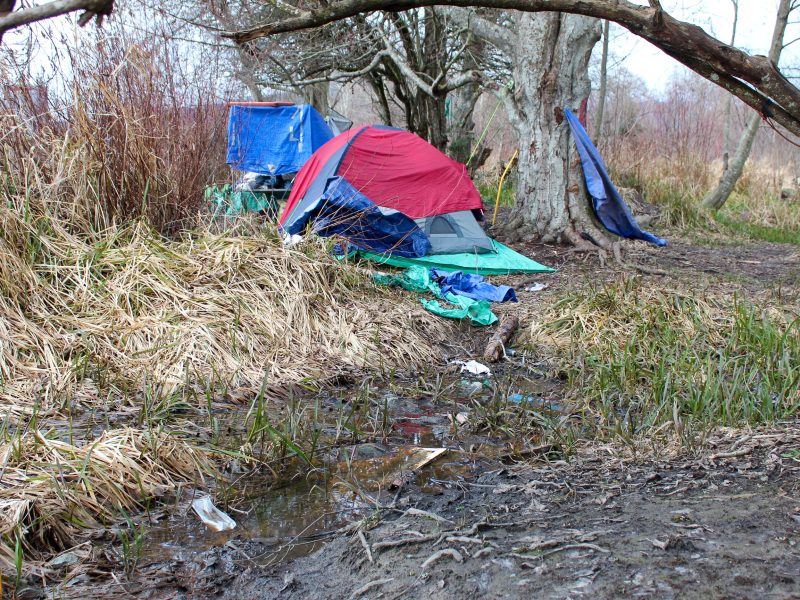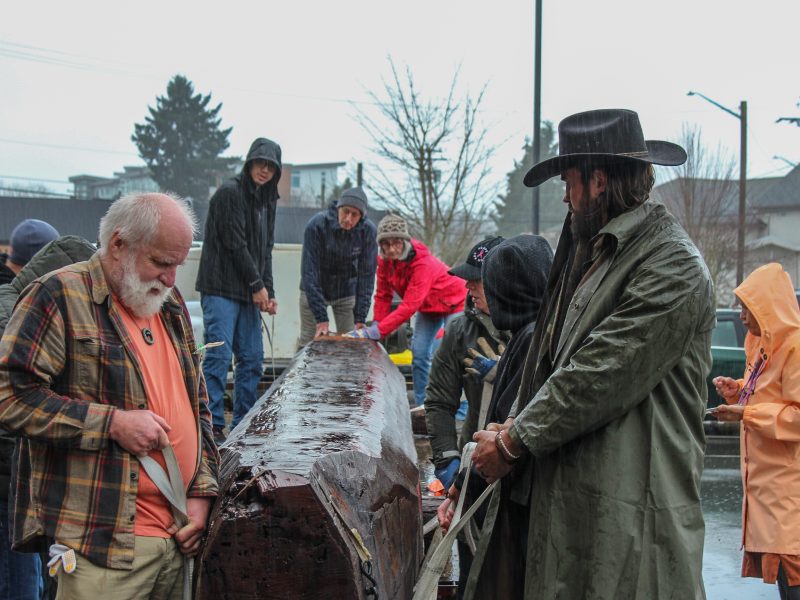
Jared Qwustenuxun Williams is a chef, a food sovereignty advocate, the elders’ kitchen manager with Cowichan Tribes, a storyteller and a writer, among other things. This is the second article in a three-part series on Coast Salish food systems. Read the first article, about traditional food and cooking, here. There is a glossary of Hul’qumi’num words at the bottom of the article.
I set out to write this second article to focus on the change in foods when the hwunitums arrived. I had expected to hear stories about fried bread and bologna sandwiches. But what I got was far from the humour-filled concept of post-colonial foods and more about the sheer impact the hwunitums had on access to resources and the overall devastation settlers wrought upon our food web.
I was honoured for the chance to talk to elder T’uwahwiye’ (Mena Pagaduan) about the change in our foods when the hwunitums arrived. T’uwahwiye’ is a knowledgeable Cowichan Elder who has worked for many local and provincial organizations, representing Cowichan culture and language. I also took a chance to bug my shuyulh Sytheyatthun (Louie Williams), who was raised in a home where traditional foods were the everyday norm.
The first hwunitum settlers came to Cowichan in 1862. The impacts of settlement and colonial policies grew after that. As these interviews show, many of the disruptions to traditional food systems are still felt strongly today, and elders in the community have witnessed these changes play out over their lifetimes.
Loss of access
“They put lots of restrictions on how and when we were allowed to harvest,” my shuyulh Sytheyatthun said. “There was a no-gathering law. So if they seen a gathering of more than five Indians they were like, ‘Oh you guys are going to jail.’ So everything went undercover. You can’t gather that much food for people if there is just one of you.”
My silu’ T’uwahwiye’ also mentioned specific harvesting restrictions. “Those restrictions on everything all come into play. With not only the foods from the ocean — kw’atl’kwa — or the thuthiqet, but we couldn’t even get q’uxmin cause most of the q’uxmin was all in parks. It affected all sources, the medicinal plants, the greens, the fish, everything.”
Sytheyatthun’s comments also spoke to the incredible impact of provincial restrictions on harvesting. “You know, you go into the forest to get some bark of a cedar tree to make some baskets or something, and they say, ‘You’re not allowed to do that. You don’t have a permit to do that, that’s harvesting lumber.’ You wanna go fishing, you don’t have a licence for that, or you can’t go fishing this time of the year. You can’t go clam digging because of the red tide. They put all sorts of different regional restrictions on us that forced us to have to buy something else, and then they price it outta the market. Some of us who have jobs can afford it, but you go try and buy a crab at the fish market, and the guy wants 25 bucks. Back in the day my dad would get a bunch of crabs and give them to the people, however many they want. Now if you go to the fish market and buy 25 crabs you’d be broke.”
T’uwahwiye’ told me about the impact of a loss of access to hunting and fishing grounds, even within her husband’s lifetime. “Peter used to be able to go fishing. He’d go way up any road and he’d know a trail down to the river. Now, there is fences up now everywhere. Those changes have been big.”
Lack of food availability
One point that was repeated in almost every interview was the fact that our once-abundant foods were quickly depleted by hwulunitum. T’uwahwiye’ summed it up best by saying, “One habitat affects another one. The environment was just going — and now it’s kind of finding its way back, with people at a standstill, so to speak.” She went on to say, “In the 70s, 80s and 90s you know when you get to the theew’t-hw there is gonna be 75 ducks to do every Saturday, no fail. You know that was going to be there.” She concluded her duck story by saying, “It’s too bad we don’t get that much ducks anymore, and different things like that.”
But when Sytheyatthun talked about the abundance of foods in yesteryear versus the state of the environment today, he said, “Our family would all get together and dig clams, or they’d go chop wood, or whatever. They’d jump on the canoe and go fishing, but we don’t do that anymore because of the lack of resources.”
Change of teachings
Something else I noted that came across strongly on the topic of changes from contact was the impact on cultural teachings of food harvesting, preparation and preservation. It hit me when Sytheyatthun said, “My dad got a gaff hook for us [to fish with] and there we were standing by Skutz Falls, rains pouring down. You’d think a seven or eight year old kid shouldn’t be anywhere near the falls, but my dad was all for it. If he did that today, the parent police would be all over him because if you fall in you are not coming out till the bay.” What resonated most was how he concluded the story. “How many people do that, nowadays? How many people take their seven or eight year old kids and say, ‘Let’s go to Skutz Falls.’ See how that works out for ya. Long time ago that was the standard rate. You just went up there and you did as you were told to do. That was part of the fun for me — we were involved in the process. Eating our foods was the cherry on top, you know, because my grandma would make us clam chowder or we would have smoked fish and rice.”

When I talked to T’uwahwiye’, she too talked about a lack of teachings. She noted how years at residential school had taken away the parents’ ability to teach their children how to function in our traditional world. “Lots of fragmentation in families, whereas before it used to be everybody in the household had a job to do. Everyone. No matter if you were the youngest, there was always something to do. So you don’t get that too much nowadays, lost big time, the bonding, and the work ethics, holy smokes.”
She told a story that showed how people expected each other to have these old teachings. “One time somebody said, ‘I got some meat for you, for the work on Saturday.’ I said, ‘Just leave it on the back porch.’ Well, when I get home it was a whole moose! Muy’! I thought, what kind of skills do they think I have?”
Colonial food expectations
During my conversations it became apparent that the expectations and tastes of the new settlers had a major impact on the foods we ate. My silu’ T’uwahwiye’ messaged me a few days after our talk and noted something she’d remembered. “I was cooking s-axwa the other day, still reflecting on our talk. That was a hard one to take when we’d still be in school or out in the public. How we were called stinking?! We were really unaware of what that was all about, at that time. That had an impact on a lot of people.”
My shuyulh Sytheyatthun’s story really sent the message home. “My grandmother adopted my brother and I. One day the social service worker comes to the house, an unexpected visit, to check on us to make sure everything was OK. There was my brother and I sitting at the breakfast table, it’s about eight o’clock in the morning. My grandmother had just put some fish heads in the oven to eat for breakfast. The social service worker comes in and says, ‘What’s that smell? My grandma pipes up and she says, ‘Oh, it’s fish heads.’ The social service worker automatically thinks that we’re eating fish head for breakfast. Well the radar goes off, back in the day. Thinking — this is not good, there’s not enough money to go around. You know, wondering — why is this family eating fish heads for breakfast? You know — can’t they eat cereal or waffles or what have you? My grandma was like, ‘No, these are for me, this is a traditional meal for me.’ He put it together slowly. But his instant reaction was — why aren’t these kids eating cereal, or fruit loops, or something? We were gonna have some, but the guys instant racial thought was totally biased and not thinking outside the box. See my grandma, she’d have all those things for breakfast, she’d have a raw sea urchin first thing, a raw clam right off the beach, or an oyster. She could shuck ‘em just as fast as you could get it in the bucket, you know.”
The introduction of telu’
Money changed the economy of generosity and slowly forced people to start charging money for foods. Sytheyatthun talked about the cost of a crab then and now. “My grandmother would get ten crabs in one sitting for twenty bucks. Now you give a guy twenty bucks and you get two crabs, if you’re lucky. So were stuck eating Spam and Klik and stuff that’s generally not healthy for us to eat. A pound of bacon is what, eight bucks? So families are living on hashbrowns and bacon. Our food lifestyle has gone down the drain compared to when we used to eat fish.”
My elder T’uwahwiye’ summed it up pretty simply by saying, “You know it’s then of course telu’ came into the picture. Now today it’s like, ‘You want some s-axwa’? Twenty bucks.’ You know, that has taken kind of a toll on people wanting to have seafood or meats or anything.”
Closing thoughts
In conclusion, the biggest impacts that contact had on our traditional foods were the direct impact on our ecosystem, our ability to harvest, and the food discrimination we faced, all paired with the introduction of money and capitalism. Today our people have to pay exorbitant costs to eat foods that were once free and plentiful. Many now rely on processed, low-cost foods that directly impact their health and wellbeing.
In essence, in order to help hwulmuhw people return to our old foods, we have to first help the environment return to a state of diversity of abundance. For hwulmuhw people’s diet, livelihood, health and culture are all directly connected to the health of our environment.
Huy tseep q’u siem nu siiye’yu,
Qwustenuxun, grandson of Qwustanulwut
Hul’qumi’num words
- hwulmuhw – First Nations people
- hwulunitum – non-First Nations people
- hwunitum – non-First Nations person
- kw’atl’kwa – ocean
- muy’ – an expression of surprise or dismay
- q’uxmin – lomatium nudicaule, a plant in the carrot family
- s-axwa’ – clams
- shuyulh – older sibling or cousin
- silu’ – grandparent, great uncle or great aunt
- telu’ – money
- theew’t-hw – longhouse
- thuthiqet – forest
This Food For Thought article is made possible in part with funding from the Real Estate Foundation of BC and Journalists for Human Rights/RBC. Their support does not imply endorsement of or influence over the content produced.



